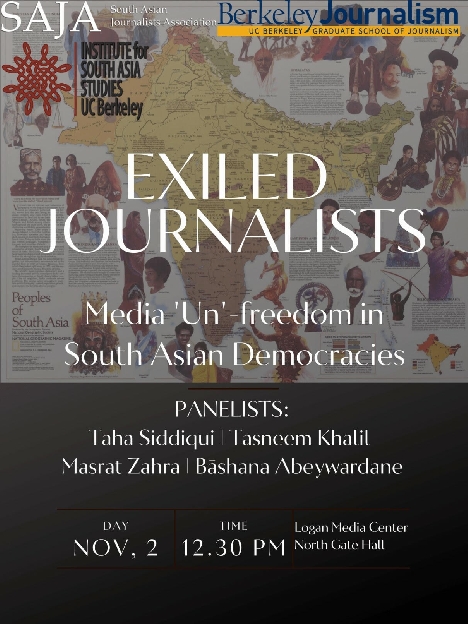As authoritarianism, hypernationalism, military intervention in politics, and ever-widening ethnic and religious fault lines have taken hold in South Asia, journalists in the region often find themselves at the forefront of the erosion of democracy. With global attention shifting to more pressing concerns, journalists in South Asia have fled their countries at an alarming rate.
The panel hosts four South Asian journalists who are in self-imposed exile in faraway countries, having been forced to flee the country because of their journalism.
Meet the panelists:
Taha Siddiqui: Taha Siddiqui is an award-winning Pakistani journalist living in exile in Paris since February 2018. He currently runs the DISSIDENT club, an intellectual bar/cafe where dissidents of the world meet.
Mr. Siddiqui moved to France with his family after surviving an assassination attempt on his life in January 2018, for his journalistic work, by armed men believed to be working for the Pakistani military. He was being threatened by the military for several years preceding to the attack. In Pakistan, Siddiqui worked for the New York Times, the Guardian, France24, Arte, the Christian Science Monitor, Al Jazeera, and many other international and local media organizations. He received the prestigious Prix Albert Londres (aka the French Pulitzer) in 2014 for a documentary on the issue of poliovirus in Pakistan and Afghanistan.
Since moving to Paris, Siddiqui has been working with various French and international media organizations and has written for The Guardian, The Washington Post, Foreign Policy, and Al Jazeera, among many other outlets. He is also teaching journalism and human rights at the well-known French university SciencesPo. He also manages two digital media platforms called South Asia Press and SAFENewsrooms. His first book: an autobiography in the form of a graphic novel, will be published by the French publishing house Glénat by 2023.
Tasneem Khalil: Tasneem Khalil is a Bangladeshi journalist currently living in Sweden. He is Editor in chief of Netra News, an independent platform for public interest journalism focusing on Bangladeshi politics, society, and culture. He previously worked for The Daily Star in Dhaka and was a CNN reporter and a Human Rights Watch consultant.
On 11 May 2007, he was detained and tortured in custody by Bangladeshs military intelligence for his reporting critical of the security forces. Under international pressure, he was released a day later and left Bangladesh shortly afterwards.
Khalils commentaries appeared on major publications including The New York Times, BBC, The Financial Times and Al Jazeera. His book, Jallad: Death Squads and State Terror in South Asia, was published by Pluto Press in 2016. He tweets at @tasneem.
Masrat Zahra: Masrat Zahra is an independent photojournalist and documentary photographer from Indian-controlled Kashmir. She has covered Kashmir since 2015, and her pictures of human rights violations and everyday hardship have received international acclaim. In response to her work, the Indian government charged her in 2020 under an anti-terrorism law for posting photographs on social media that glorify anti-national activities, for which she faces up to seven years in prison.
Her work has also appeared in The Washington Post, Al Jazeera, and TRT World, among others. In 2020, she won the Peter Mackler Award for Courageous and Ethical Journalism and the Anja Niedringhaus Courage In Photojournalism Award from the International Womens Media Foundation. Zahra's work has also been exhibited in Newyork, Germany, Buffalo NY, India, Kashmir. Currently she is 2022-2023 Knight Wallace Fellow at University of Michigan. @Masratzahra
Bāshana Abeywardane: Bāshana Abeywardane entered journalism in 1992 and soon became a founding editorial member and later, the editor-in-chief of the alternative weekly Sinhala language newspaper Hiru, which was managed autonomously by the editors. As a result of his critical newspaper columns, in 2006, he had to leave Sri Lanka under severe threats to his life.
Following his initial stay under resident programme for persecuted writers and artists offered by the Heinrich Böll House in Germany, Bāshana received three year resident scholarship under "Writers in Exile Program" hosted by German PEN Club.
In May 2022, he presented Expert Witness Testimony at the Sri Lanka Hearing of Peoples Tribunal on the Murder of Journalists, hosted by Permanent Peoples Tribunal and organised by the Safer World for the Truth Coalition. He continues to publish in various online journals and is currently serves as the coordinator of Journalists for Democracy in Sri Lanka (JDS), a human rights campaigning group founded in 2009 by Sri Lankan journalists and writers in exile.

